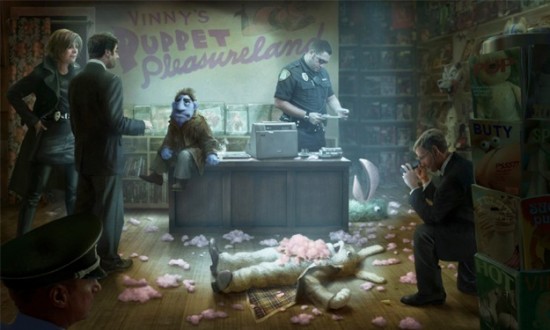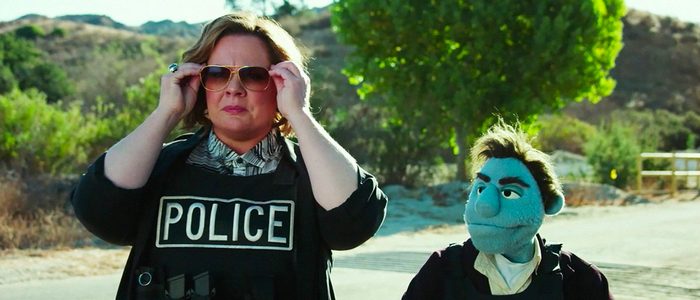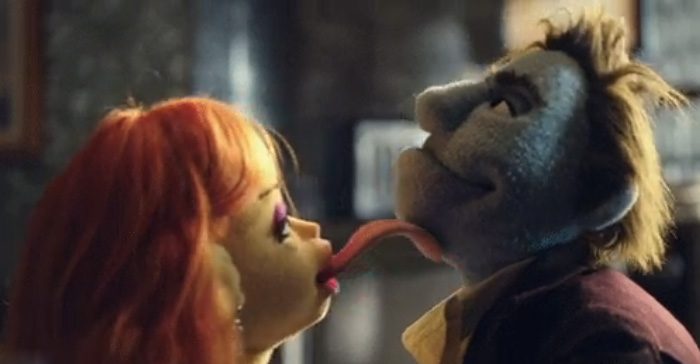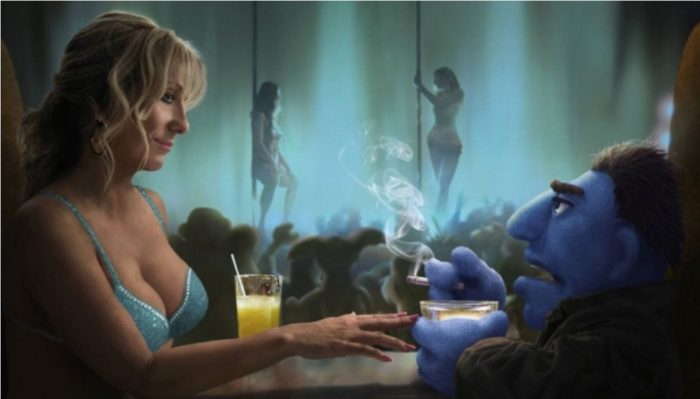'The Happytime Murders' Director Brian Henson On Bringing Puppets To R-Rated Territory [Set Visit Interview]
Last October, I traveled to Santa Clarita to visit the set of The Happytime Murders, the new film from Brian Henson. Anyone who knows me knows that I'm a huge Muppets fan, and I've been singing the praises of Brian's "Battleground" episode of Nightmares & Dreamscapes: From the Stories of Stephen King since that premiered over a decade ago. So I am very excited to see what Brian does outside of the studio that Kermit built. And judging from the trailers and what I saw on set, this movie will likely be a big surprise to those who haven't seen his work at Puppet Up.
During our roundtable interview, Henson discussed the 10-year process of bringing the script to life, creating 40 new puppet characters, going too far with the dirty humor, blending real puppets with CGI puppets, what he learned from his father and the difficulty of puppeteering in a jacuzzi.
So, Brian, maybe just go to the beginning, what was the genesis, the seed of this that got you all excited?
Actually really interesting. It was Todd Berger [who] wrote the very first draft of the script probably 14 years ago or something like that. And he had sent it over to us. And I had read it back then. And it's quite different now 'cause this is a long, long time later. And I said it's too R-rated. It's just not what we do, but I said good luck. And then I started the show Puppet Up. And we started doing improv comedy with puppets. And we do a live show that's very R-rated, that's improv comedy. And then I thought this is really good. We found a new voice for puppets. It's really funny. It's kind of viciously funny. And it's a contemporary funny. And I thought, oh this is good. This is a good next place to take Henson-style hand puppetry. As a place to take Henson-style hand puppetry.
So then I thought, well let's, we should do something scripted, something longform in this tone. And then we remembered this script that we had passed on. And so it came back around and I met with Todd and I said, let's develop it. It needs a lot of work. But yeah, so that was really the genesis that from Puppet Up I decided, no, I wanna do something that's R-rated that's letting the puppeteers rip. And then with Todd...I've had the script with Todd for close to 10 years now. And we've done many, many drafts. And I couldn't be happier with where it ended up. You think you're seeing a shock comedy with puppets where puppets are doing what you never thought they would see, but then it actually is actually a really compelling story. And the characters are really deep and well-developed characters, so it's sort of a one-two punch. I think people will come in thinking I wanna see puppets doing what I have not seen Henson-style puppets do. But then what they get is actually a really good movie with really good characters.
You said characters and apparently there are about 125 parts.
Oh puppets, yeah.
And 40 of them are brand new that you developed. So what was the mindset of the type of characters that you want to create that we've never seen before?
So here's another interesting...that's a good question. 'Cause usually with the Henson Company, we put design continuity into production design and characters. And it's a very lovely finish. But what we discovered, again with the Puppet Up show, the improv show, which was a live show, which we couldn't, it's theater, so we couldn't afford new puppets. So we pulled out a bunch of old puppets to do that theater show. And then I just started testing it. And saying, well if it does well, we'll remake puppets and have them all look like they're from the same family of puppets. And then we realized that having the puppets look like they come from every different type of show you can imagine, but all sort of in the Henson vein. There aren't suddenly marionettes or Sicilian broad puppets walking around. They're all in sort of that Henson family. But they deliberately mismatch. You can have a completely abstract bear kind of puppet talking to quite a realistic humanoid puppet, you know. So we've actually deliberately mixed it up because what we found was that lent itself to adult humor. And it also lends itself in this movie. This isn't a designed movie. This happens to be a world that is our world where puppets are alive and they get different jobs and stuff like that. But they are all of these different looks, all sort of jumbled together. So it's deliberately a wonderfully weird mixture of puppets.
 So with this R-rating and the subject matter, anything that you thought maybe as you're making the movie like okay, that's too far? Was there anything that didn't make the cut? Or did kind of everything manage to make it in there?
So with this R-rating and the subject matter, anything that you thought maybe as you're making the movie like okay, that's too far? Was there anything that didn't make the cut? Or did kind of everything manage to make it in there?
Well no, some things... And I may have shot stuff that goes over the line, too. I'm not sure. We've not been censoring ourselves. We did have a bar scene with a bartender puppet that had a singing penis, which was a very funny joke that we decided not to do. So that one won't make it in the movie. Yeah, you know what, we probably have gone, we probably have stepped over in a couple of places that I'll learn as I get it all cut together and then maybe pull it back a little bit. But the idea is it really is uncensored. So it really is, it is quite dirty. But it's mostly language and implied sexuality. It's not graphically sexual. It's puppets [cumming] silly string. But you don't see their penises. But really there's some pretty graphic, ridiculous ideas that are in there. But it's there's also a little bit of an innocence to the characters and the story, but it's in a gritty, tough world.
I have to say being Canadian, I talked to Melissa about it, thank you for the maple syrup mention, shout-outs and...
Oh, there's lots of maple syrup. Well we just decided that we couldn't think of anything sweeter to us than maple syrup because the idea is she's a sugar addict. And so the idea is she gets to maple syrup because that's as far as people will go. But the puppets who are sugar addicts, they go all the way to a level of sugar that doesn't exist. We imply that there is sugar that is so sweet that only puppets could eat it. If a person ate it, they'd immediately go into sugar shock.
What's something technically that you guys are pushing puppetry-wise that you've never done before?
Well, we're doing quite a lot of...it's one of those that I don't want a big deal, but I, as much as possible we really are performing the puppets. In fact, really we are, we're always puppeteering everything. Occasionally, the puppets will be CGI, but I'm hoping invisible to the audience. And even when we do that, we real time puppeteer CGI characters, we're using the CGI sometimes because the puppet needs to do something that we can't actually do in the set. Or we can't actually do on location. But even then we want them always puppeteered. So it's, it allows us to see a little bit more of the puppets and let them, let the audience see them doing more stuff that they're not used to seeing them do. But hopefully in a way that's invisible.
 Can you explain the CGI puppets?
Can you explain the CGI puppets?
Oh we've been puppeteering CGI for oh 12, 13, probably no, more like 18 years now. And we developed a system a long time ago that is a real-time animation engine. So that we could do animated characters that were being puppeteered. So as we got further and further into that and we do some TV series that way and stuff like that, we realized we could bring it all the way to photo realism. That same technique so that even when it's CGI, even if a puppet is CGI it's still actually being, it's a real time puppeteered CGI character. So the movement should match perfectly. It's just being done as a technique to get it on film.
Why hasn't this been done before? Why have we not seen an R-rated puppet movie till now?
From us. You have. Team America is a hard R-rating and it's marionettes and Meet the Feebles is a hard R-rating. And it's so we're not first. This is more like it's sort of an over in the area of Who Framed Roger Rabbit but with a lot of sort of bad language and stuff like that.
Why did we do it? I feel like we've always been a little bit naughty. And the Henson Company is considered a very family friendly brand. At the same time, people go yeah, but they're cool, they're a little bit naughty. We're not Disney. We're not wholesome. In that sense. We are socially responsible hopefully. And but we're kind of the cool and weird ones. And so this is us doing that. And I actually am deliberately rating it R because I actually want to make it clear this is for adults. And if you do it PG-13 and just skate the edge and do a PG-13 movie, if I did it, I'd still have an audience full of five-year-olds and that would be a problem. So by making it R rating I'm making it clear it's for adults.
But one thing that I have to say as a kid and my Dad always loved, all of the puppeteers loved, it was what they could do when the cameras were rolling after the director calls cut and before the director calls action. And actually all of our humor comes out of a very blue place. A very sort of naughty, dirty humor place. That's where all of our, even the well known Muppets were developed out of that instinct. And then censored to make it... But you know that Kermit has some dirty thoughts and Piggy certainly does. Snd certainly as a kid watching them shoot, you get to see it all come out, but not when the cameras are rolling. And so there's a lot of fun taking that was my favorite part almost of watching my Dad working was that naughtiness was just so deliciously funny. And everybody, the crew would be laughing so hard. And it's like wow, can we take this? Can we take that and make it part of entertainment? And the Puppet Up show, the live theater show that we've been doing is that. And it works really well with audiences. So the feeling was you know what, I think it really does, so let's go the whole hog and try a movie.
From when your Dad started to now, have puppets changed like in their essence?
I don't think puppets will ever change in their essence. Which, I think, is why people say, well isn't CGI gonna take over puppetry? Isn't computer animation gonna take over? Maybe. But only in as much as CGI is gonna take over acting and actors and all that. Puppetry is kind of a different, it's the art of infusing a life... Ah, not anthropomorphic's not right. Infusing a personality and a life and a sense of background and everything to that water bottle. That's kind of puppetry. And you could make a hilariously funny movie about this water bottle probably if you thought about it hard enough. Or not maybe movie, but maybe a two minute piece. But puppetry, what it comes from, it's like when you're a parent and your kid is throwing a temper tantrum and you go, really? Would you be throwing a temper tantrum? I mean, if it was this water bottle, hey, I wanna throw a temper tantrum. You shouldn't throw a temper tantrum. That's not very nice to your family. Yes, it is. No, it's not. I mean, that's what we do. We do that for our kids. We do that for everything.
It takes you out of your subjective self and puts you in a more objective place. And puppetry has always done that. And it's one things that's great about it is you're entertaining the child, the innocent and open child inside of all of us, because a puppet comes on screen, you know, you make no preconception. No assumptions about them. You don't assume anything about their personality or their sexuality or any of that. You wait and you learn like a child does. And that I think is why puppetry has been around so long and it will be forever. Aand that isn't really so much, so the essence of puppetry I don't think will ever change. The tools of how you can realize puppetry I think are changing all the time. And like I said, when we do CGI puppetry and what we call digital puppetry, we are delivering a computer-animated product that looks like a computer animated show. But it's fully puppetry. The approach. So I think in that sense, puppetry sort of evolves, but at the essence of what puppetry is I think it has always been what it is.
 Why did you choose to play the Crab? Of all the characters you could play, why did you choose that one?
Why did you choose to play the Crab? Of all the characters you could play, why did you choose that one?
I didn't wanna do any. Truthfully I didn't wanna do any. I was like, this is a really tough movie to direct. There are an awful lot of moving parts and it's a really complicated movie. So I wasn't gonna do any. And then there was this Crab and this Boar in my show Puppet Up I often perform that Crab. And so I guess I think it was Bill, Bill Baretta, I think said to me, hey, why don't you and I do the Boar and the Crab? And I was like okay. Even though it was one of my hardest days on location and then suddenly I was inside a garbage can trying to direct the movie. And as I was inside the garbage can and we had dressed the garbage can 'cause it was one of our garbage cans, it was a fake garbage can with fake garbage around the top. But clearly, somebody had thrown in a half bottle of beer into it when we were looking the other way. So I climbed in the garbage can, I reach my arm up in and old beer was dripping down my arm. And I was inside a garbage can. I think my instinct for not puppeteering while I was directing was probably bang on. But I did it 'cause it's a funny, very simple puppet that I like a lot.
Have you had to come up with any other story ideas while you were working on this? Like a puppet cinematic universe kind of thing. Like different stories that intermingle.
Well, not so much while working on it, but before we put this into pre-production, yes. Todd and I have been throwing around ideas of intersecting storylines that can happen in this universe. Exactly what you just said is something we have been thinking about and considering.
When he shot Social Network, David Fincher notoriously did 99 takes on certain sequences. And I'm watching you here, two or three, you move on. Is there something more controlled about having you and Bill, the puppeteer going on? Where you get the nuances quicker and faster?
Well, that's a toughie. It's I grew up in the industry in the '80s in London where often in a day you would shoot six shots. The industry has generally moved to you shoot 20 to 40 shots. And I'm sitting somewhere in the middle. So I'm going at the speed of very high-level television or pretty quick feature. Like David, if David Fincher was directing this, we would be shooting for 10 months and the movie would cost a lot of money. So some of it is I let people bring what they wanna bring and I don't try really hard to push them into... I think the job of the director is to have a vision and a plan and a pretty specific plan but then fully respect the artist who is coming in, in whatever aspect they're coming into the film and let them present what they think. And run with it unless it upsets the vision completely.
Do the puppeteers allow that?
Oh, the puppeteers absolutely. I let them bring what they wanna bring and I adjust rather than telling them what to bring. And directors that tend to have very high take counts literally think that, feel like they know where you should blink your eyes, what angle your head should be at and all of that. And I certainly don't work that way. My Dad used to say, people would say, did your project come out the way you intended? And he said, well certainly not. I had 300 incredible artists who collaborated with me and it's the result of only what that group of 300 artists could have produced. And certainly not. And I feel much the same with this. It evolves and it adjusts and my job is to have a vision I think and hold it all together. But also flex with all of the great, creative people that are involved.
I'm curious if how much thought was put into the creation of this world? Like the puppets existing alongside humans. I know in like the Muppets that's never really like addressed like they're just there. Did you guys come up with rules and such?
A little bit. Not as far as we perhaps could have gone at one point. We were thinking if they went down the street, they would be the small doors and the small stairs for the... And in the end, largely it's the logistics of making movies, we thought you know what, let's go with the idea that puppets are have-nots in this world that the best they can do is try to exist in a world that's been created for human beings. And then complain about it all the time. And so that's sort of what we've run with. We have come up with, there's prejudice in this world. A lot of prejudice, so don't ever call a puppet a sock. It's a really nasty thing. So whenever anybody calls Phil a sock, it gets a really big response. Puppets, when they're mad at people, call them meat sacks, flesh bags. The puppets a little less, not quite as rude, is to call them a feltie. We've done some work more on the social aspect than the actual physicality of the world.
This movie obviously went through a bunch of different iterations. There were actors that have been attached. What is it about Melissa and–?
Well, mostly it was a rumor, rumor, rumor. So mostly there were lots of rumors over the years. Which was fun. Everybody loved the script so much that as soon as a rumor took off and usually there was some truth to it. But actually, nobody was ever attached until Melissa was attached. And Melissa was actually the first attachment to it.
 So then what did Melissa change about it? What did her coming into it bring to it?
So then what did Melissa change about it? What did her coming into it bring to it?
Oh, where to start? First of all, Edwards was written as a male character. And the whole idea was and interestingly now, several years back, Todd and I thought we're trying so hard to differentiate between Phil and Edwards in the writing that one character or the other keeps suffering because of it. And we thought you know what, I think they're in a testosterone pissing match. They're both trying to out-tough each other.
They both break the rules. It's just that one of them got thrown out of the police force and the other one didn't, but they both probably deserve to be, but they're also both great at their jobs. And they've all both got moral compasses that ultimately are pointing exactly the right direction. But the characters were in the end written quite similar. I guess you could call it a buddy comedy. They come together eventually. But we thought with one of them being a puppet, one being an actor, it really works. It really worked well. And then when Melissa came in, it was remarkably little that we did to shift the character. Melissa's approaching it as a tough cop who breaks the rules and is a testosterone pissing match with Phil. I mean, she didn't feminize the character, which was really kind of wonderful.
And then, of course, she brings what Melissa brings, which is this loose, spontaneous style that grows out of a lot of improvising on set. Let's try it this way. Let's try it this way. But she really is when it comes to comedy, she can do no wrong, you know. She's the best there is.
What's your toughest set piece? What are you asking your puppets to do that's raising the bar?
Oh, everything.
I mean, like I think they talked about Kermit riding a bicycle years ago. Where are you taking that now?
Oh. No, not so much. I didn't not so much. 'Cause it's the whole thing is tough though. Like every scene what the characters are doing is tough. It's... I don't know that I can say specifically what the thing is. I usually learn as I'm in post what I feel like is the... There is a sex scene that is so hilarious and yet not graphic particularly. There's a lot of wonderful stuff.
A Muppet on Muppet or...?
I can't talk about it anymore.
I'm just curious but can you ever do water sequences with a puppet or no? Does that have to be–?
Oh yeah, we put a puppet in a Jacuzzi in this one. We played a Jacuzzi scene with a puppet.
How does that deal with–?
They soak up a lot of water. You have to work through the wall of the Jacuzzi through a giant rubber glove. And don't ever let the rubber glove invert or the entire Jacuzzi will go back into the rubber glove. No, we've done it. Yeah, they just get really, really wet. We have a fight scene kind of in the Jacuzzi as well.
